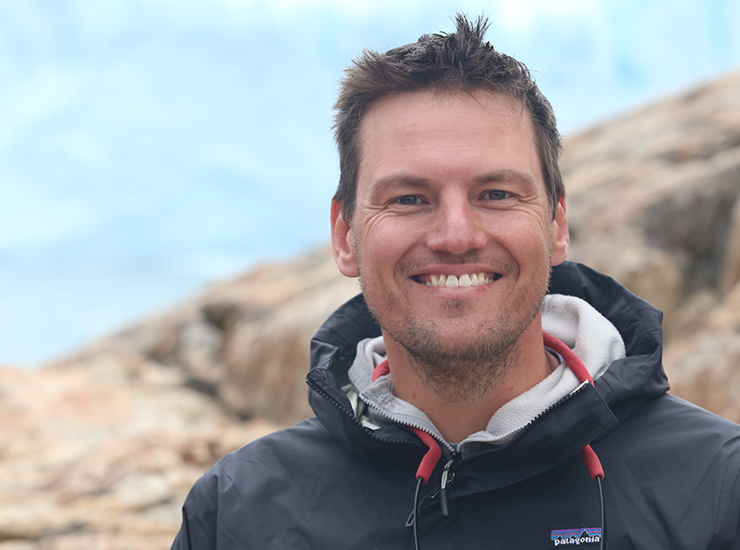What geology is and how to become a geologist
April 09, 2021
April 09, 2021
For U.S. News & World Report, geologist Nate Gardner shares advice for aspiring geologists and how someone can tell whether the field is a good fit
Many people think geologists spend their days just looking at rocks. But it’s “much more complex than that and often involves figuring out what is going on beneath a planet’s surface,” according to Stantec geologist Nate Gardner, who spoke to U.S. News & World Report about the profession.
“For instance, someone who takes a walk through their local park may see a hill, a stream, and a cliff,” he says.
“Not to sound dramatic and cliché, but a geologist sees a story unfolding over millions of years where continents collide, ice sheets wax and wane, and erosion from thousands of storms denude the land.”
For more, read the full article at U.S. News & World Report. Nate also shares advice below for aspiring geologists.

Many geologists obtain a four-year degree from a university specializing in earth science. In addition to core geology courses, a typical curriculum would include at least some entry-level interdisciplinary coursework in physics, chemistry, and math. Writing is also extremely important and is often overlooked—what good is good science if you can’t document and communicate it clearly?
Like any field, if you really drill down into subdivisions of geology, it’s far reaching. Therefore, an entry-level undergraduate course is key to understanding the breadth of earth science. From there, students can pick a series of classes that fit the subfield they choose. And those classes don’t necessarily have to be in geology—they can be physics, chemistry, ecology, biology, engineering, etc. Undergraduates can start to specialize in a specific field, and then go on to graduate school to specialize further. For instance, a senior undergraduate may start to specialize in hydrogeology (the study of water in rocks and soil), and then go to graduate school to study something as specific as the geochemistry of arsenic-bearing rock aquifers.
There are some employers or subdisciplines that require advanced degrees, but a master’s or doctorate are not generally mandatory to work as a geologist. I have noticed that the higher level of education someone has, the more assumptions employers make about writing and analytical capabilities, as well as salary expectations (i.e., someone with a PhD may be discounted for an entry-level position, making it difficult to get an initial foot in the door). There are plenty of extremely capable people in the workforce with bachelor’s degrees.

Surveying boulder beach elevations for a morphologic/climate change study in Terra Nova Bay, Antarctica (2001).
Since a professional geologist can be so many different things, the question of specific key tasks is hard to answer. I don’t know the particular statistics, but I would bet that most geologists don’t just “look at rocks” as many people assume. But generally, a geologist collects and analyzes data, so typically they will have some component of an analytical personality. That said, many aspects of geology focus on the subsurface—areas that you may not be able to observe directly—so there’s also a creative, imaginative, and open-minded side to a geologist. For instance, someone who takes a walk through their local park may see a hill, a stream, and a cliff. Not to sound dramatic and cliché, but a geologist reads those very same features and sees a story unfolding over millions of years where continents collide, ice sheets wax and wane, and erosion from thousands of storms denude the land. The most important quality, though, as it is in any scientific field, is being inquisitive.
Since the field is so wide ranging, there’s a massive range of jobs a geologist can find. There are geologists who assess whether the ground in a location can support a skyscraper or an ice-cream stand. There are petroleum geologists who look for and recover economic quantities of oil, and there are remediation geologists who clean up spills of oil. There are geologists who study earthquakes themselves, and there are geologists who assess risk of slope failure or coastal preparedness as a result of earthquakes. There are geologists who climb volcanoes to sample 2,000-degree lava, and there are those who sit behind a computer analyzing mountains of data. There are even geologists who study ancient animals (fossils), water, or planets.

Hydraulic conductivity testing of an aquifer in Avon, Massachusetts.
Many geologists are drawn to the field because they love the outdoors. They like seeing and exploring landscapes and don’t mind getting dirty in the process. If you enjoy learning about the planet and are curious about how the landscape in which you live has come to be, geology may be for you.
As a kid I had always wanted to be an architect or engineer. When I was struggling with less-than-engaging courses in college, my mother suggested taking an environmental course—something I knew absolutely nothing about. I remember immersing myself in the sections of the textbook that discussed how mountains form, how streams behave, and how ice sheets shape the landscape—about a week before classes even began. I was hooked.